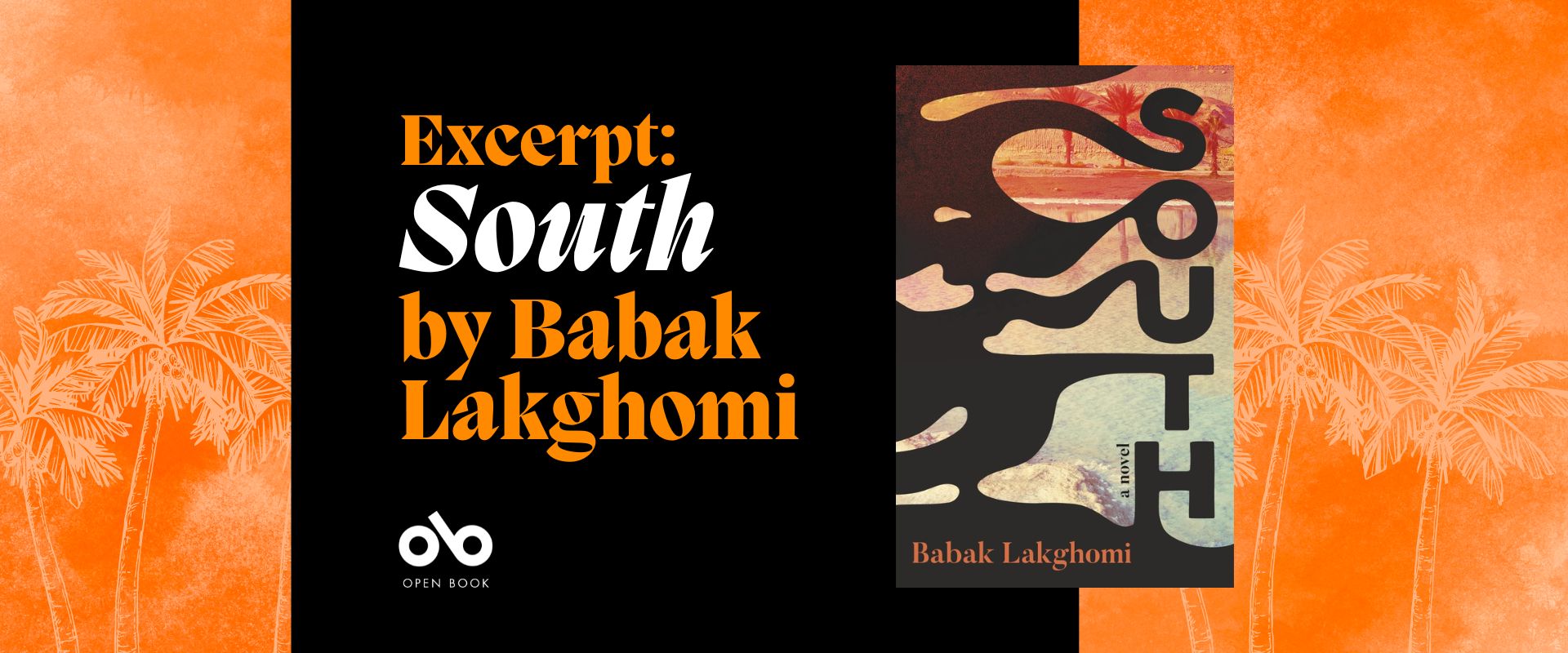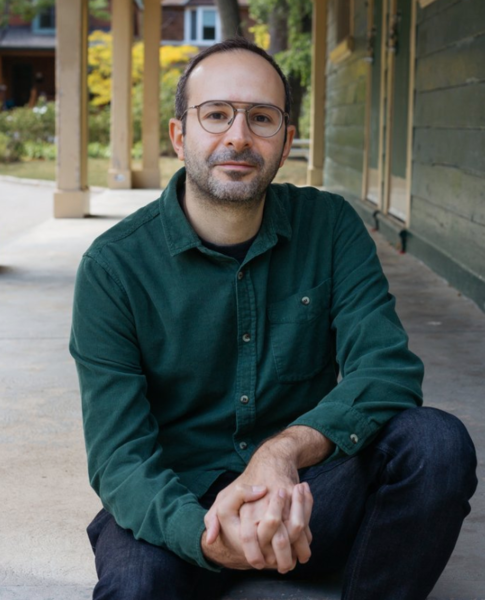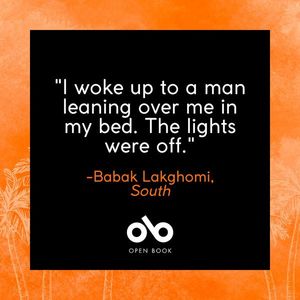Read an Excerpt from South by Babak Lakghomi, a Disorienting, Dazzling Tale of Totalitarianism & Truth
Babak Lakghomi's new novel South (Rare Machines/Dundurn Press) is set against a bleak totalitarian landscape, following B, a journalist on a search for truth. A dazzling, disorienting addition to Dundurn's new Rare Machines imprint, it follows B when he is sent to report on strikes aboard an offshore oil rig.
He arrives as a talented writer with a book project on the go, a married man, a competent reporter. But the strange, unworldly atmosphere he descends into not only strips away the logic of the harsh world in which he lives, but brings to the foreground his own mysteries, in particular his father's disappearance. An arid landscape plagued by drought and shadowy enemies intent on censorship and their own agenda combine to push B towards a kind of madness as he does everything in his power to resist and uncover what is true.
Described as "hypnotic" and "Lynchian", Lakghomi's novel is a tightly controlled, brilliantly rendered world tipped slightly sideways – nothing is quite what it seems, and B's mysteries keep readers guessing till the end as Lakghomi's sparse, cut-gem prose keeps the puzzle-like story unrolling smoothly. Tense, claustrophobic, and at times haunting, South is an audacious, timely, and mesmerizing story that digs into contemporary concerns about surveillance, isolation, and power.
We're sharing an excerpt today, courtesy of Rare Machines, in which we things begin to fall apart for B, even as he slowly acclimatizes to life on the rig.
Excerpt from South by Babak Lakghomi:
I climbed into my bed with the laptop and the second envelope. I propped the pillow between the wall and my back. I wanted to respond to Tara, not let things become worse between us again.
I opened the laptop and typed a couple of sentences. But I was getting anxious about the thicker envelope. I kept wondering what was inside it. I couldn’t postpone opening it.
The envelope wasn’t something I was expecting. The email was from my publisher and included the edits on the first chapter of my book.
He’d printed the manuscript, commented on it, then scanned the commented version. The Secretary had printed the emailed document in colour.
Many lines were crossed out with red pen, the Publisher’s handwriting all over the text.
I started looking at his comments.
Your CanLit News
Subscribe to Open Book’s newsletter to get local book events, literary content, writing tips, and more in your inbox
Anything about my father being laid off from the factory had been removed from the chapter.
Excerpts of the interviews I had conducted with his former colleagues and friends were all cut out. I had included many of these colleagues as anonymous interviewees, as I was concerned about their safety. I wondered if that had something to do with the Publisher’s reaction.
What remained from the first chapter were mainly photos that I had included, along with the text the Editor had written.
A photo of my father in his store after he was laid off.
A photo of him with his own father when he was ten, on a boat on a lake.
A copy of the newspaper showing my father’s name as the winner of a student poetry prize.
A photo of the remote-control car he had sent me with his last letter. I had kept the broken car all these years.
The Publisher had added descriptions in the margins and asked me to expand more in some places, including about my father’s childhood and his parents, his education in high school.
The words blurred into each other. My breath became the breath of a pearl hunter opening an empty shell.
Please implement my edits to this chapter. We need to get this ready soon, but it will need some restructuring. Unfortunately, it still requires lots of work.
This was written in the body of the email. He’d read the whole manuscript before. Had said he’d loved it, then.
Something had changed.
Heat rushed into my head. His prose rang like the noise of an air compressor.
I was furious. The book wasn’t supposed to be a biography of my father.
It was my attempt to find out who he was, to understand why he’d left and stopped communicating with us.
The Publisher wanted a different manuscript now.
I thought it would be best not to respond. I needed to talk to him in person. I could stand behind my choices, explain why things were as they were.
I went to bed, covered my head with the blanket. I wanted to sleep and wake up to a different reality.
I blinked in the darkness. I heard the rustling of my body against the sheets, the humming of the ventilators in the hallway.
I smelled my own sweat.
Unfortunately, I was awake.
The walls were thin as paper. Once in a while I heard people speaking or shouting in the hallway, but couldn’t make out their words.
I was used to rejection, but this felt different.
The promise of publication had given me hope. It had helped me stay sober.
But it had been a mirage.
The bed smelled like a bed in a train.
I rolled over and lay on my side. I removed the blanket and looked at the black boot marks left on the grey wall, the greasy fingerprints along the cracks, insects smeared on the wall.
I ran my fingers over the cracks.
I wondered if I was partially to blame, for believing people for things they said.
I took another sleeping pill.
***
I woke up to a man leaning over me in my bed. The lights were off. Like a dream when you wake up to a stranger in your room, I wanted to scream.
I didn’t know where I was.
Then I noticed the birthmark. I remembered the morning and the c-cans.
“You scared me,” I said.
“I thought you’d miss dinner again,” the Assistant Cook said. “You missed lunch.”
His hand rested on my shoulder like it was trying to tell me something.
“Is everything all right?” he asked. “You disappeared without saying anything. Have you been sleeping ever since?”
My mouth had a taste to it. My tongue felt heavy. I was distracted by the birthmark.
“I am okay,” I said.
“Were you having a dream?” he asked. “You shouldn’t stay alone here so much.”
In my dream, I had been swimming in a creek, following a painted stork. It led me to a marsh where the corpses of other storks floated on the water through the reeds and canes. I found one of the bodies that was still moving, tried to hold it and swim back to the creek.
The reeds tangled with my shins. I was sinking in the marsh. The water was black like oil. Viscous like tar.
“Things haven’t been exactly easy,” I said. “I am going through a rough patch.”
He moved his head around like he was looking for something in the cabin. A worn-out towel hung from a hook on the wall. His eyes stopped there.
The cabin smelled like a hospital room. Of sickness when you don’t leave your bed for days. I looked at the other corner of the room where my suitcase was.
“Let’s get you out of this cabin,” he said.
“I need to change,” I said.
“It’ll help to freshen up,” he said.
I found my toothbrush in the suitcase and took it along with me.
In the hallway, the fluorescent lamps fused into each other, become a long block of light as I walked faster. I wondered for how many days I had been on the rig, how many days I hadn’t showered.
In the bathroom, one of the toilets had overflowed, a stream of waste on the floor. Flies flapped their wings onto the lamps.
I held my breath. I tiptoed around the puddle, splashed water on my face. I looked at the mirror, then brushed my teeth until my gums bled. I spat red into the sink. I gargled several times until the water was clear.
If Tara were here, she would make me shave. Every day, before sitting at my desk, I’d wake up and shave and shower as if I was actually going to work.
“You need a better routine to function,” she’d said.
I ran my fingers through my beard. I remembered that I still hadn’t answered her email.
I took off my shirt and splashed water under my armpits.
When the Assistant Cook knocked at the bathroom door, I put my shirt back on and buttoned the top of my coverall.
I looked at the mirror again. I still wasn’t used to my new appearance: a man with a beard in a blue coverall. My hard hat had gone crooked again, but I didn’t try to straighten it.
“Let’s go,” I said.
__________________________________________________
Excerpt from South, a novel by Babak Lakghomi, published by Rare Machines, an imprint of Dundurn Press. Copyright Babak Lakghomi, 2023. Reprinted with permission.
Babak Lakghomi is the author of Floating Notes. His fiction has appeared in American Short Fiction, NOON, Ninth Letter, New York Tyrant, and Green Mountains Review, and has been translated into Italian and Farsi. Babak was born in Tehran, Iran, and currently lives and writes in Toronto.






